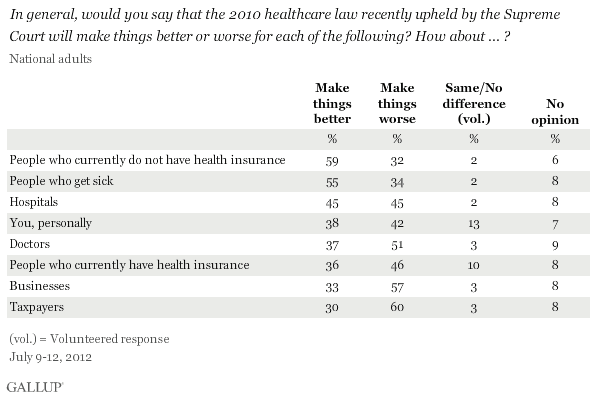Americans' responses to our recent set of questions about the impact of the Affordable Care Act help us understand the major overarching difference point in this presidential campaign: the appropriate role of government.
The results, as I reported here on Monday, basically show that Americans are aware of the benefits andthe costs of the ACA legislation:
Americans clearly perceive that the healthcare law would benefit those without insurance and those who get sick. Americans agree, it appears, that government programs can in fact help citizens. As we have seen in other countries around the world, government can provide health insurance, provide income to those who don't have much money, provide retirement, provide healthcare for all, guarantee job security, and do almost anything it wants.
At the same time, Americans clearly perceive that the ACA would hurt taxpayers and businesses. Taxpayers would be "hurt" presumably because Americans perceive that someone will end up paying for a government program that provides insurance to those who currently do not have it. And businesses presumably are perceived as being hurt for the same reason.
Thus, Americans' reactions to the ACA underscore the central trade-off of our times -- the value of the government stepping in to help those who are in need or discriminated against versus the costs in terms of money, efficiency, and involvement in people's personal lives. Barack Obama, and the groups of Americans who tend to support him and the Democratic Party, clearly view the government as an entity that should use its force and might to fix social problems and help the unfortunate and those who cannot fend for themselves. Mitt Romney, and the groups who support him and the Republican Party, view the government as an inefficient mechanism for fixing problems, and one that takes away individual freedom and initiatives.
Note that even Republicans -- who overwhelmingly oppose the ACA -- are as likely to say the ACA will benefit those without health insurance as to say it will hurt them. Republicans presumably still oppose the healthcare law because they think there are other ways to help those without health insurance.
All of this goes along with the fact that the public remains roughly divided in its choice between the two presidential candidates, who represent in broad ways the two approaches to the appropriate role of government.
This continuing divide occurs even though consumer confidence as we measure it here at Gallup is as low as we have seen it since January. About six in 10 Americans say the U.S. economy is getting worse. And two-thirds of Americans mention some aspect of the economy as the most important problem facing the country.
Ordinarily this would spell trouble for an incumbent president.
Of course here we can get into a discussion of what "trouble" is. As Susan Page and I discussed in ourElection Matters webcast this week, one can argue whether the incumbency glass is half empty or half full. Some say Obama has managed to stay competitive in the race despite the dour economic perceptions of the average American out there across the land. Others can argue that Romney has managed to stay competitive in the race despite the substantial and focused criticisms of Romney from the Obama campaign team.
What we know for certain is that we simply have not seen major shifts in this race. As I discussed here, we have seen Obama move marginally ahead in our massive, large-sample tracking. The latest updated three-week average through July 15 shows Obama maintaining a two-percentage-point lead, 47% to 45%, over Romney. But this is not a huge margin. Registered voters nationally still appear to be generally split in their vote preferences.
Watching Obama at the U.S. Olympic basketball game in Washington on Monday night - as broadcast on ESPN - brought home one significant Obama strength. He comes across well. Our latestmeasurements showed Obama with a significant "likable" edge over Romney. Eighty-one percent of Americans say Obama is likable, compared with 64% who say that about Romney. Obama also does better as the candidate who understands Americans' problems. And cares about people like "you."
How much this is helping Obama is unknown at this point. But in general it certainly can't hurt to be personally likable. This likability edge for Obama adds to Romney's challenges.
Romney has opportunities ahead to improve his likability quotient. First will be the hoopla surrounding his announcement of his vice president, most likely coming in August after the Olympics are over -- if he doesn't surprise everyone and announce it this week. Then it's his convention performances, and his debate performances. Both of these are more important for Romney than for Obama. The public knows Obama after four years. Romney, despite being around and being heavily involved in the GOP primary process earlier this year, is less well known to Americans. His goal for his high-visibility moments during the VP announcement, the GOP convention, and the debates is presumably to a) become more likable and b) convince voters that as president he can do a better job than Obama on the jobs front.
I focused on "jobs" in b) above because that is what Americans were most likely to tell us is needed when we asked them last week what they would recommend to fix the economy. Twenty-eight percent mentioned jobs outright, while another 9% said quit "outsourcing" jobs. We'll have more on that here ongallup.com on Thursday morning.

